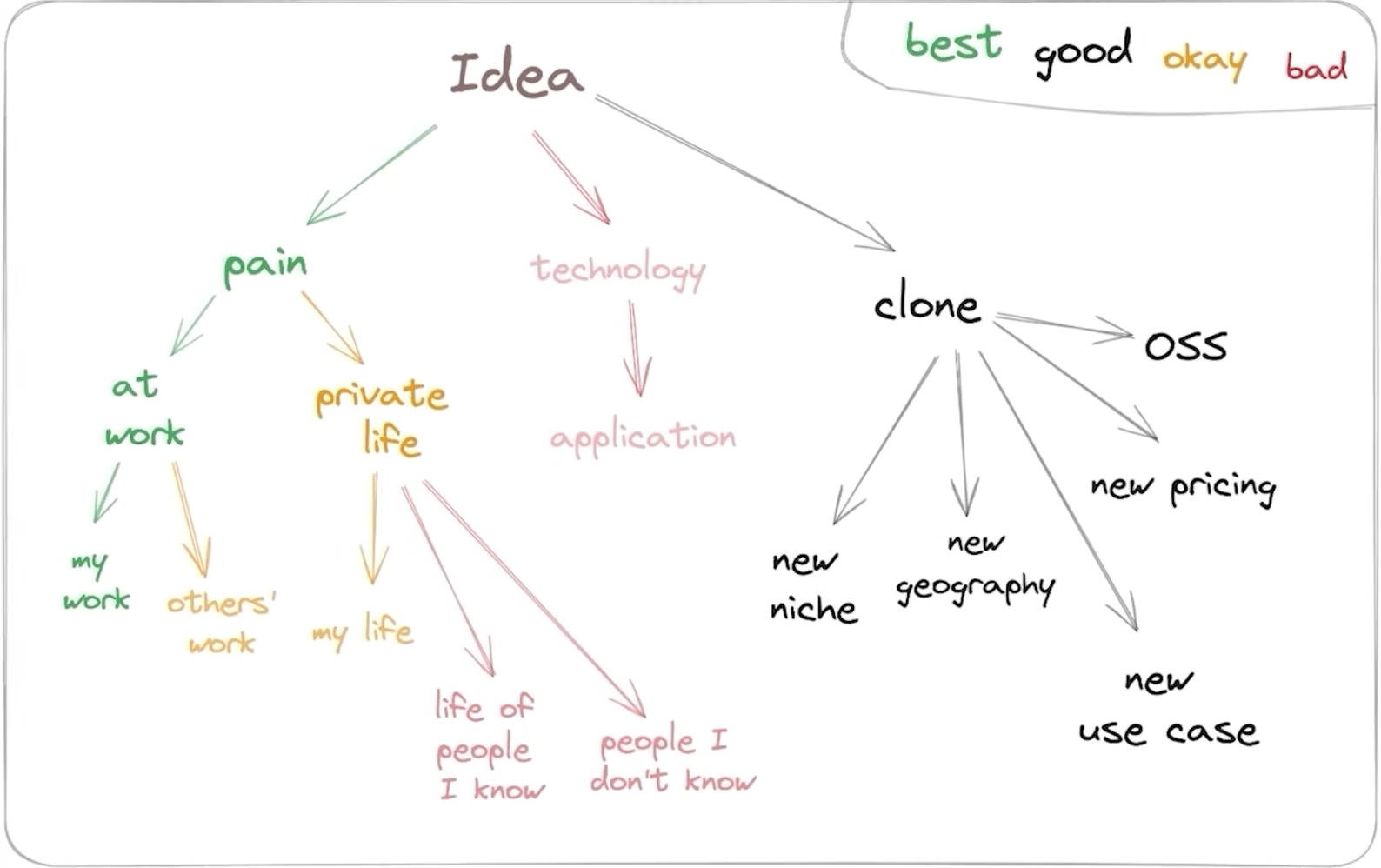Happy Monday!
In case you forgot, I’m that guy (@thekoerneroffice on the socials) that you probably found in a short form video talking about random business ideas.
Who am I? I’m Chris Koerner: Dad of 4, husband of 16 years and proud Texan. I’ve started 75+ business (3 worth over $10m) and give away all of my learnings for free in a once/week email. Bookmark this toolkit with 1,000+ free business plans!
Okay! Let’s get into it. I spent an hour a couple weeks back with a guy named John that I found on twitter. He’s a founder that runs 24 different projects that generate $3 million in annual revenue.
Zero employees. Just him and a bunch of AI agents.
The simplicity of his approach made me feel like an idiot for not doing it years ago. It’s almost all completely vibe coded and automated. I reached out to him to talk so I could pass on the “how-to” to you. He got super nitty-gritty on how to find business ideas, how to validate and launch them. You can literally start some of these tonight.
If you get pumped reading this, and you want to dive into further, we dive into detail further in this episode. You can go watch or listen to in its entirety here: YouTube, Spotify, and Apple Podcasts.
Okay, first off, here's how you find ideas that actually have demand:
Go to Google. Type "website builder for" and watch what autocomplete suggests. That's the hack.
Google shows you what people are actively searching for, ranked by volume. Website builder for small business. Website builder for photographers. Website builder for artists.
Each one of those suggestions represents thousands of monthly searches. Real people. Real demand. Right now.
Take those keywords into a research tool and validates the traffic. Artists? Over 92 keywords with 100,000+ monthly searches combined. And almost zero competition from niche players.
Everyone's building the next Squarespace or Wix. Nobody's building the website builder specifically for tattoo artists.. or wedding photographers.. or pottery makers. That's the gap. That's where the money lives.
The Negative Bias Test
Most founders fall in love with their ideas. John does the opposite.
He tries to kill every idea before he builds it.
Josh’s rule? If you can't convince yourself NOT to build something after running it through validation, then it might actually work.
Here's the process. Build a simple waitlist landing page, a little free tool you can build vibe-code with Replit, Readdy or Wegic in about 20 minutes. Not a full product. Just a page that says "Hey, this thing is coming. Want in?"
Then drive 100 people to it through cold outreach, Reddit replies, Twitter DMs, wherever your audience hangs out. If zero people sign up? Good. You just saved yourself three months of building something nobody wants.
If 10 people sign up? You might have something.
But he then takes it one step further. He asks people to pay upfront with a massive discount. Like 70% off just to pre-order.
If less than 10% of your waitlist converts? Kill the idea. You're selling to the wrong audience, or the problem isn't painful enough, or the price is way off.
But if people actually pay before the product exists? Build that thing immediately.
Pro tip. Once you build that thing, try out HighLevel to automate your follow-ups.
Here's why I love HL: Someone fills out your form. Instantly, they get a text. Two minutes later, an email. If they don't respond in 24 hours, another text. Three days later, another email. A week later, one more check-in. All automatic.
Stats back this up. Businesses that follow up within five minutes are 20 times more likely to convert than those who wait an hour. Most people wait way longer than an hour. Or forget entirely.
HighLevel makes sure you're always first. Always consistent. Always there when the lead is finally ready. They've got a 30-day free trial at gohighlevel.com/tkopod
Okay so you’ve figured out the business idea, you’ve validated, launched, now you start the SEO work on day one.
Most people say "SEO takes too long, I'll do it later." Then a year passes. And they still haven't started because it takes too long. Meanwhile, if they'd just started a year ago when they first had the idea, they'd be crushing it right now.
John’s approach is different from the average founder. He always launches SEO content immediately using tools that write and publish articles automatically. Then he walks away for two months. It’s building while you start building something else.
When you come back, the traffic patterns tell you everything. Some URLs get zero traffic? The competition is too fierce. Some URLs get surprising traction? That's where you double down.
It's validation through actual search behavior instead of guessing with keyword tools.
Growth Channels
The reason free little tool landing pages convert so well is simple: you've already solved a problem for someone, so when you mention your paid product, they're actually listening. Push the little tools here:
Social media. Not just for direct traffic. When you get popular on Twitter or LinkedIn, everyone else becomes your marketer. Influencers mention you. Bloggers write about you. Directories add you. For free.
Affiliate partners. But here's the key. Be insanely generous with commission. Not 10% or 15%. Try 50%. If your product has low costs, give away half the revenue. You'll actually get people promoting it.
Place your product everywhere. Directories, forums, Reddit, Quora. Not just for traffic. Because LLMs crawl those sites and add them to training data. Suddenly ChatGPT and Claude start recommending your product.
Build free tools as lead magnets. If you're selling a website builder for artists, build a free album cover generator. They use it. They love it. They trust you. Then they see your paid product and actually convert because you've already delivered value.
The Real Opportunity
The opportunity isn't building the next billion-dollar startup. It's building a portfolio of $50K-$500K products that serve underserved niches.
VCs are all chasing the same massive markets. That leaves thousands of small, profitable problems completely ignored.
Website builder for musicians... Tax software for small RV park owners... Accounting automation for solopreneurs who hate bookkeeping.
These aren't sexy. They won't get you on TechCrunch. But they're sitting there waiting for someone to build them. And you can build these in one evening using tools like Replit, Readdy, or Wegic.
Some of these niche products make just $1K per month. Doesn't sound like much until you realize they feed customers into your bigger products through cross-selling. One small directory making $1K might contribute another $3K in revenue because visitors discover your other tools. It could get crazy.
Try this today: Pick a niche you understand. Go to Google. Type "[your category] for" and see what autocomplete suggests. Take the top 10 ideas into a keyword tool. Find the one with the most search volume and the least competition.
Build a waitlist page now. Drive 100 people to it this week.
And just see what happens.
Before I sign off, real quick, my franchise consultant buddy Connor Groce and I are hosting a live webinar breaking down what makes a franchise worth buying in 2025. No corporate pitch deck. Just real talk about what actually works.
We will be covering: how to spot a dud franchise before you waste six figures, Connor's 3-legged stool framework for evaluating deals, the biggest mistakes first-time buyers make, and so much more.
It’ll be one hour long and super tactical. We're doing Q&A at the end, so bring your questions. Register here. You’ll get the recording after the event.

Again, if you want to start something now and want to dive into further, go watch or listen to this conversation in its entirety here: YouTube, Spotify, and Apple Podcasts.
Get out there and take action. Everything is figureoutable.
Have a great week!
Chris
P.S. I share deep dives on business ideas and complete playbooks three times a week on YouTube and every podcast platform.

